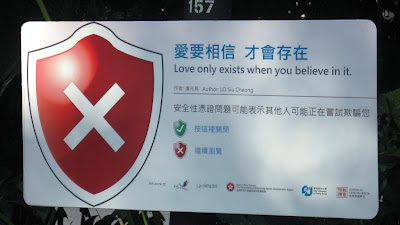I tried asking them if I could apply for a change from a student to visitor visa-no. I asked if they needed a letter from Rotary- no. They informed me that the only way I could stay longer in Taiwan was to leave the country and come back on landing or other visa. Americans can stay up to one month in Taiwan on a landing visa, so after discussing the situation with my host Rotarians, we decided the best way to solve the issue would be for me to go to Hong Kong for a couple days. Danny, one of my host Rotarians, helped me find a good travel package for a flight and two nights in a hotel for less than $350 US.
My visit turned out to be a pleasant adventure. Hong Kong is truly a balance of East and West. There is still much evidence of British colonial rule, but a lot like Taiwan, the culture is distinct and unique. Huge, western-style shopping malls decked out for Christmas, but just a couple blocks away are narrow winding streets of eastern-style markets selling everything from clothes and antiques to fresh fruit and raw meat. The architecture is a mix too, of East and West and old and new. Life in Hong Kong moves at a much faster pace than Taipei, but I found the the many city parks are like an oasis, where many people escape during the day to enjoy and slow, quite lunch.
Not surprisingly, BainBain had a contact in Hong Kong, Ms. Wai Fong Suen, who works on extension projects related to integrating art into school curricula. She went to a training workshop at Lincoln Center in New York in 2001 and began her project in Hong Kong in 2002. She was formerly a theater performance artist, and she has recruited several other local artist to give tours to school children and train teachers to integrate art in to the curriculum. BainBain's current projects deal with promoting farmers' art and art tourism in Taiwan, but she is interested in developing a stronger program with schools, so I brought back information for her from Ms. Suen.
Ms. Suen lives on a island, which is about an hour ferry ride away from downtown Hong Kong. She was a gracious host and showed me around her city, making special note of the public art work on display. Hong Kong is currently hosting the East Asian Games, which is like a regional, mini version of the Olympics. Ms. Suen showed me a special art display called "Making the Familiar Unfamiliar" in Hong Kong Park. It displayed several creative forms of art, and used "e-language" or internet style postings to introduce visitors to the displays in the park; they called it E-Park (click here to see a video). I have uploaded more pictures in two albums online:
Pictures of first day in Hong Kong; Pictures of second day in Hong Kong
Special thank you to Ms. Suen (pictured above) for showing me around Hong Kong and treating me to dinner and to Danny for helping me plan the trip and find my way around Taipei Main Station!


























































